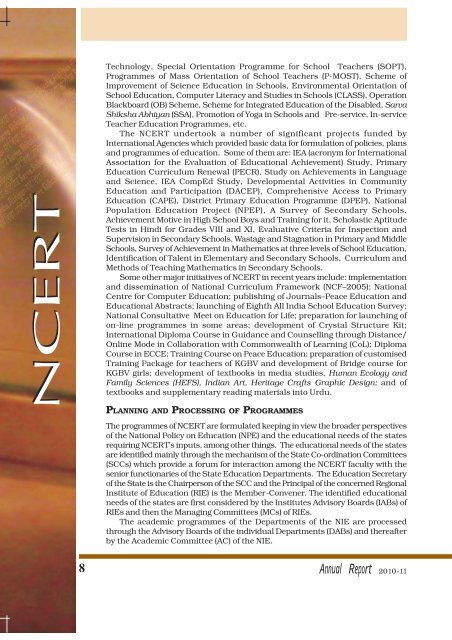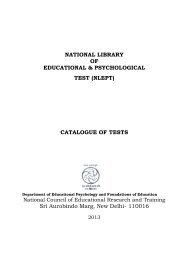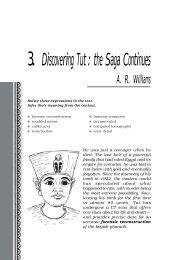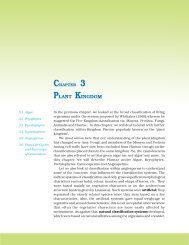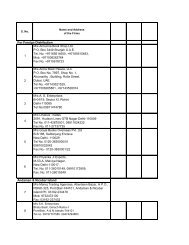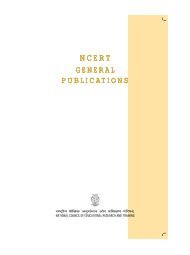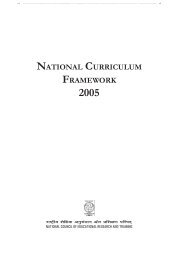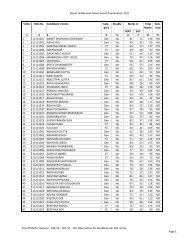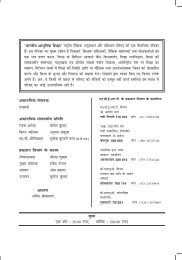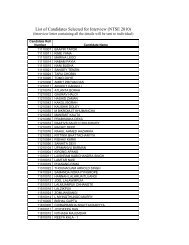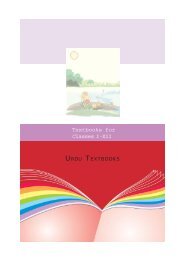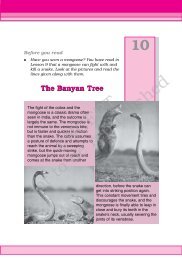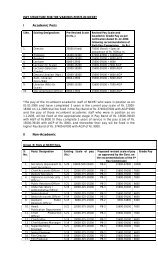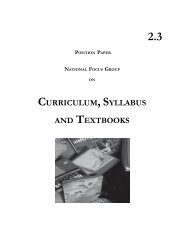Annual Report - National Council Of Educational Research And ...
Annual Report - National Council Of Educational Research And ...
Annual Report - National Council Of Educational Research And ...
You also want an ePaper? Increase the reach of your titles
YUMPU automatically turns print PDFs into web optimized ePapers that Google loves.
NCERT<br />
8<br />
Technology, Special Orientation Programme for School Teachers (SOPT),<br />
Programmes of Mass Orientation of School Teachers (P-MOST), Scheme of<br />
Improvement of Science Education in Schools, Environmental Orientation of<br />
School Education, Computer Literacy and Studies in Schools (CLASS), Operation<br />
Blackboard (OB) Scheme, Scheme for Integrated Education of the Disabled, Sarva<br />
Shiksha Abhiyan (SSA), Promotion of Yoga in Schools and Pre-service, In-service<br />
Teacher Education Programmes, etc.<br />
The NCERT undertook a number of significant projects funded by<br />
International Agencies which provided basic data for formulation of policies, plans<br />
and programmes of education. Some of them are: IEA (acronym for International<br />
Association for the Evaluation of <strong>Educational</strong> Achievement) Study, Primary<br />
Education Curriculum Renewal (PECR), Study on Achievements in Language<br />
and Science, IEA CompEd Study, Developmental Activities in Community<br />
Education and Participation (DACEP), Comprehensive Access to Primary<br />
Education (CAPE), District Primary Education Programme (DPEP), <strong>National</strong><br />
Population Education Project (NPEP), A Survey of Secondary Schools,<br />
Achievement Motive in High School Boys and Training for it, Scholastic Aptitude<br />
Tests in Hindi for Grades VIII and XI, Evaluative Criteria for Inspection and<br />
Supervision in Secondary Schools, Wastage and Stagnation in Primary and Middle<br />
Schools, Survey of Achievement in Mathematics at three levels of School Education,<br />
Identification of Talent in Elementary and Secondary Schools, Curriculum and<br />
Methods of Teaching Mathematics in Secondary Schools.<br />
Some other major initiatives of NCERT in recent years include: implementation<br />
and dissemination of <strong>National</strong> Curriculum Framework (NCF–2005); <strong>National</strong><br />
Centre for Computer Education; publishing of Journals–Peace Education and<br />
<strong>Educational</strong> Abstracts; launching of Eighth All India School Education Survey;<br />
<strong>National</strong> Consultative Meet on Education for Life; preparation for launching of<br />
on-line programmes in some areas; development of Crystal Structure Kit;<br />
International Diploma Course in Guidance and Counselling through Distance/<br />
Online Mode in Collaboration with Commonwealth of Learning (CoL); Diploma<br />
Course in ECCE; Training Course on Peace Education; preparation of customised<br />
Training Package for teachers of KGBV and development of Bridge course for<br />
KGBV girls; development of textbooks in media studies, Human Ecology and<br />
Family Sciences (HEFS), Indian Art, Heritage Crafts Graphic Design; and of<br />
textbooks and supplementary reading materials into Urdu.<br />
PLANNING AND PROCESSING OF PROGRAMMES<br />
The programmes of NCERT are formulated keeping in view the broader perspectives<br />
of the <strong>National</strong> Policy on Education (NPE) and the educational needs of the states<br />
requiring NCERT’s inputs, among other things. The educational needs of the states<br />
are identified mainly through the mechanism of the State Co-ordination Committees<br />
(SCCs) which provide a forum for interaction among the NCERT faculty with the<br />
senior functionaries of the State Education Departments. The Education Secretary<br />
of the State is the Chairperson of the SCC and the Principal of the concerned Regional<br />
Institute of Education (RIE) is the Member-Convener. The identified educational<br />
needs of the states are first considered by the Institutes Advisory Boards (IABs) of<br />
RIEs and then the Managing Committees (MCs) of RIEs.<br />
The academic programmes of the Departments of the NIE are processed<br />
through the Advisory Boards of the individual Departments (DABs) and thereafter<br />
by the Academic Committee (AC) of the NIE.<br />
<strong>Annual</strong> <strong>Report</strong> 2010-11


